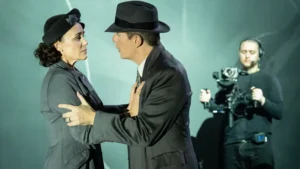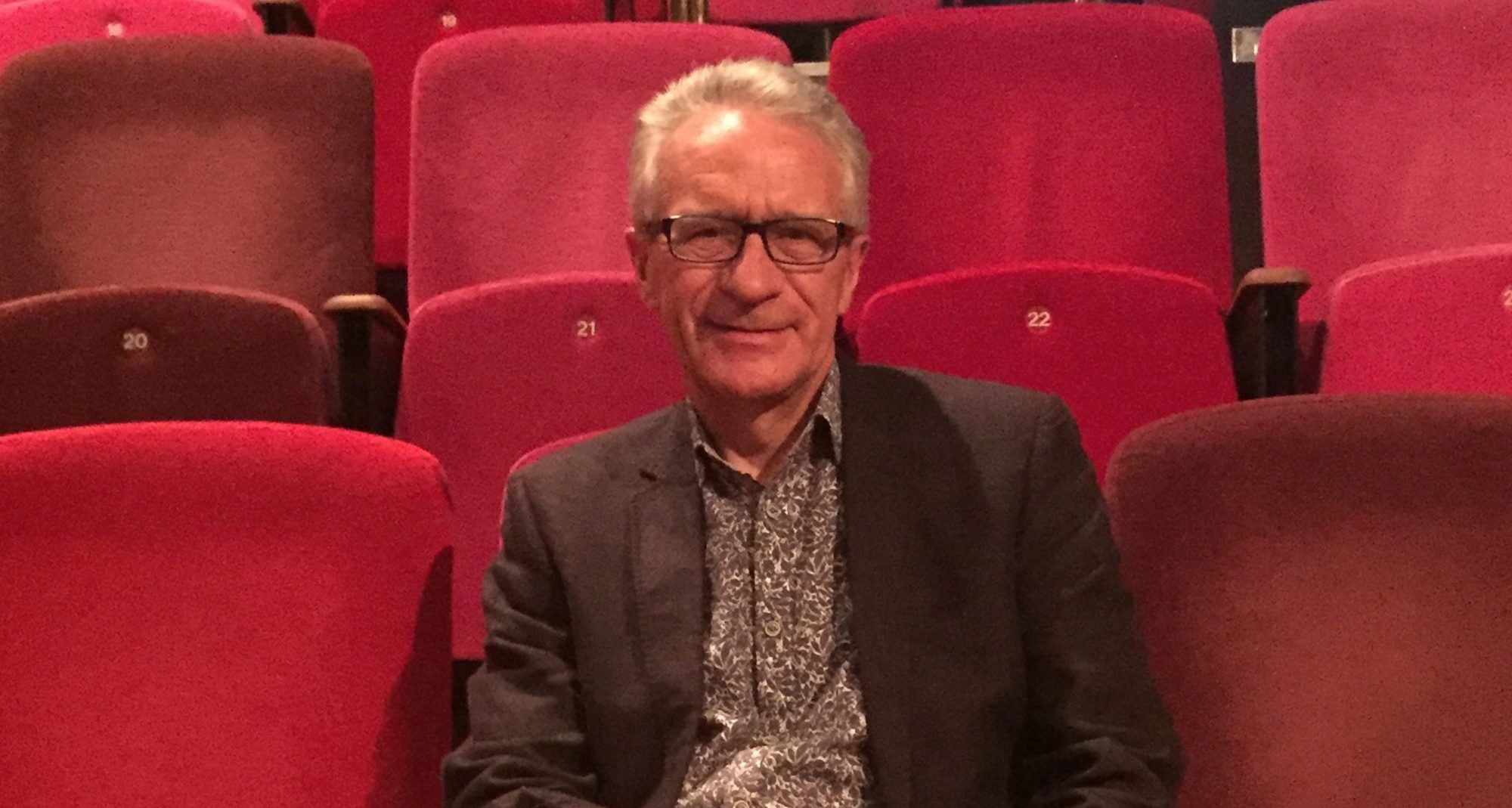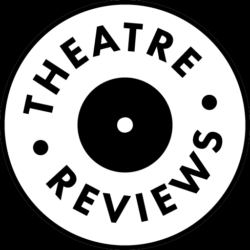Keeley Hawes and Jack Davenport rise above a messy play
★★★

The Human Body at the Donmar Warehouse in London tells the story of a middle-aged love affair to the background of the birth of the NHS.
Lucy Kirkwood‘s inspiration is Brief Encounter and other British films of the immediate postwar era that looked at women in a changing society. To hammer the point home, there are multiple occasions in the production when the action is videoed and shown on the back wall as a black-and-white film. Video has been used quite a bit in theatre productions recently, notably in Ivo von Hove‘s A Little Life and The Picture of Dorian Gray, but Ivo von Hove this isn’t. For me, the filming was a distraction, not a reinforcement, made worse, much worse, by having cameras and camera operators on stage, getting in the way, and killing the moment.
Maybe Lucy Kirkwood and the directors Michael Longhurst and Ann Lee meant us to be alienated so that, rather get too tied up in the love story, we could observe from a distance the parallels between the revolution in health care and women’s desire to abandon pre-war traditional behaviour.
The argument for universal health care is strongly made, the case for an affair between a rising politician and a fading movie star more uncertain. She rarely goes to the cinema and he is disinterested in politics, albeit able to quote Charlie Chaplin’s inspiring anti-fascist speech from The Great Dictator. Perhaps part of the attraction lies in each being outside the other’s world.
There is certainly a physical attraction between the two- the dice are definitely loaded by having them played by Keeley Hawes and Jack Davenport– and they do have in common that both are unhappy in their marriages, but, as in Brief Encounter, good old fashioned guilt and duty threaten to pull them apart. The echoes of the film are many but with some crucial changes. She, not he, is the GP. Both have greater reasons than a simple morality to stick with their spouses. And the sense of guilt and duty, in her case, extends beyond her family to take in the Party and her patients. The physical consummation of their affair is more satisfactory, shall we say, than in Brief Encounter.
Lucy Kirkwood’s dialogue is touching, heartfelt and funny and it’s an absorbing ‘will she, won’t she’ story. Ben and Max Ringham‘s score works well, sounding more like the tense background to a 1940s thriller than the stirring Rachmaninov piano notes of Brief Encounter. If only the production was as fast or exciting as the music.
Keeley Hawes plays a multi-tasking modern woman, not only a GP and would-be Labour MP, but also a wife and mother. Her husband has been disabled when fighting in the war. So, whether to save her marriage is just one of many choices she has to make. This makes the story more interesting as well as giving Ms Hawes many opportunities to display a middle-class stiff upper lip hiding a volcano of emotions. Often, when containing her feelings, she adopts a tight smile, but when she laughs, it’s as if an extra light shines on the stage. Her speech in favour of the new socialism and an end to Victorian values was so passionate, it actually received a round of applause from the audience. At all times, she commands the stage.
Admittedly, she is probably too glamorous for the ordinary woman she is meant to be. In fact, there is an unintentional moment of humour when her husband says ‘I hate your body’. There were audible intakes of breath from some people in the audience on the night I was there, as if they couldn’t believe anyone would reject the immaculate Keeley Hawes.
Top Class Cast

All the actors are top class. Jack Davenport was full of self deprecating charm as a gone-to-seed film star. Siobhan Redmond, Pearl Mackie and Tom Goodman-Hill excel in multiple parts. Thank goodness, because they save the evening.
I can’t help feeling this play was not designed for the Donmar. Fly Davis‘ mainly dark blue set design with a revolve creates a sense of the monochrome austerity of the late 1940s and, with the audience on three sides, she wisely keeps the props to a minimum. However, unless you sit in the centre block of seats, your view of the high-up screen will inevitably be partially obscured. Much more detrimental than this, though, are the many scene changes which should have been fast moving and fluid but are slowed down by mobile props- tables, chairs and so on- being trundled on and off the empty stage via the aisles in the auditorium. Worse than the time this consumed in an already overlong play is the distracting noise of the wheels and of technicians whispering into headsets.
Earlier in the day, across the river at the National, I had seen Nye, the epic story of the Labour politician who was the driving force behind the creation of the NHS. The Human Body might have been a counterpoint, offering a microcosm about the creation of the health service at a local level. Instead, while strands of the story do offer insights into the struggles within the Labour Party, and the resistance of the medical profession and the need for free healthcare, these are not the focal point. However, along with the other distractions, they are enough to take the focus away from the conflicted love affair.
The Human Body is at Donmar Warehouse, London, until 13 April. Click here to buy tickets directly from the theatre.
Paul paid for his ticket

